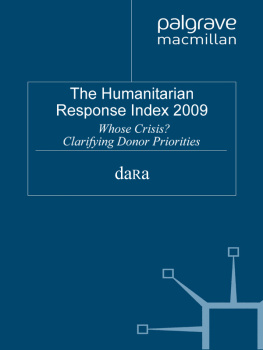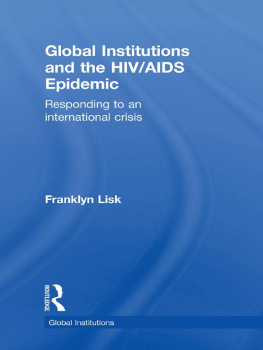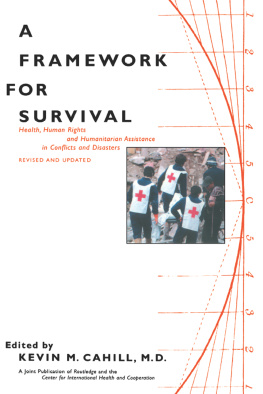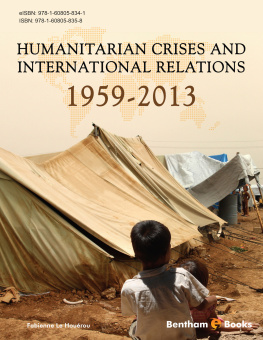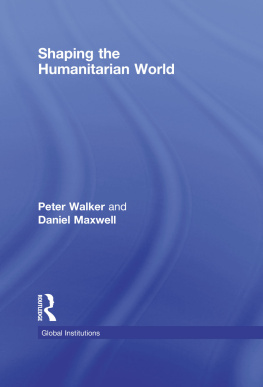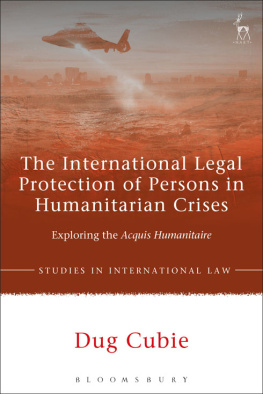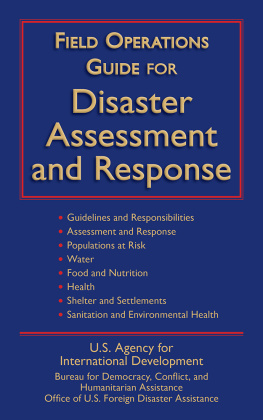The Humanitarian
Response Index 2009
Whose Crisis?
Clarifying Donor Priorities

About DARA (Development Assistance Research Associates)
DARA Development Assistance Research Associates is an independent, international, non-profit organisation, which works to improve the quality and impact of development and humanitarian interventions. We do this through research, evaluations, promoting learning and knowledge sharing.
DARA aims to enhance global efforts to reduce human suffering and inequity and encourage prevention. Our focus is on the improvement of humanitarian action, the promotion of international stability and development, and the reduction of disaster risk.
Headquarters
Felipe IV, 9 3 Izquierda
28014 Madrid Spain
Tel.: +34 91 531 03 72
Fax: +34 91 522 00 39
Copyright 2010
by DARA
 | All rights reserved. No reproduction, copy
or transmission of this publication may be
made without written permission. |
No paragraph of this publication may be reproduced, copied or transmitted save with written permission or in accordance with the provisions of the Copyright, Designs and Patents Act 1988, or under the terms of any licence permitting limited copying issued by the Copyright Licensing Agency, Saffron House, 6-10 Kirby Street, London EC1N 8TS.
Any person who does any unauthorised act in relation to this publication may be liable to criminal prosecution and civil claims for damages.
The authors have asserted their rights to be identified as the authors of this work in accordance with the Copyright, Designs and Patents Act 1988.
First published 2010 by
PALGRAVE MACMILLAN
Houndmills, Basingstoke, Hampshire RG21 6XS
and 175 Fifth Avenue, New York, N.Y. 10010
Companies and representatives throughout the world
PALGRAVE MACMILLAN is the global academic imprint of the Palgrave Macmillan division of St. Martins Press, LLC and of Palgrave Macmillan Ltd. Macmillan is a registered trademark in the United States, United Kingdom and other countries. Palgrave is a registered trademark in the European Union and other countries.
978-0-230-57349-9
This book is printed on paper suitable for recycling and made from fully managed and sustained forest sources. Logging, pulping and manufacturing processes are expected to conform to the environmental regulations of the country of origin.
A catalogue record for this book is available
from the British Library.
A catalogue record for this book is available
from the Library of Congress.
10 9 8 7 6 5 4 3 2 1
19 18 17 16 15 14 13 12 11 10
Printed and bound in Great Britain by
Hobbs the Printer Ltd, Totton, Hampshire
Foreword
Archbishop Desmond Tutu
Throughout my life I have tried to spread a message of hope and reconciliation, and urged people to do good wherever they are. It is a message shared by The Elders, a group of world leaders that I have the privilege to chair and who are committed to sharing our wisdom, leadership and integrity to tackle some of the worlds most urgent problems.
It is difficult for many of us to imagine a world of peace and harmony when we are faced with the discouraging evidence of the hard cruelty of poverty, violence and crises faced by millions every day. Yet I am convinced that despite all the misery and despair in the world, human beings are moved by compassion and solidarity. Good will always prevail over injustice, fear and anguish.
That is why the work of countless humanitarians, committed to making the world a better place for those affected by crises, is so vital. Their work is not only about saving lives and alleviating suffering. It is also about promoting human dignity and restoring hope to people whose lives have been shattered by conflict, violence, disasters and crises. Through their commitments, humanitarian workers epitomise a truth intrinsic to the African saying Ubuntu: My humanity is bound up in yours.
Governments have an important role to play in supporting the work of humanitarians, so that their efforts reach those who need help the most. That support takes many forms: from the generosity of their funding of humanitarian needs, to facilitating the work of humanitarian organisations and supporting a coordinated approach, to resolving the pressing challenges presented by humanitarian crises.
To their credit, many of the worlds governments have expressed their commitment to a principled approach to maximise the quality and impact of their humanitarian assistance. The Good Humanitarian Donorship (GHD) initiative, now signed by 35 of the worlds wealthiest countries, is an excellent demonstration that governments can set aside their individual interests in favour of those of humanity. The GHD declaration sets out a series of commitments for donor governments to contribute to improving the quality and effectiveness of their aid.
However, as is often the case, the lofty ideals contained in political declarations are not enough. Concerted actions must follow, and these efforts must be monitored vigilantly so that governments do not slip in their commitments. That is why the Humanitarian Response Index (HRI) is so important.
The HRI is an independent and objective annual assessment that monitors and ranks how well government donors are meeting their commitments to good practice in their humanitarian assistance policies and practices. Produced by DARA since 2007, the HRI annual report helps to put pressure on governments to ensure that aid is used effectively, so that people affected by crises can recover their lives, livelihoods and dignity their humanity. This years HRI asks the question, Whose crisis? and reminds us again that our focus and priority must always be directed towards preventing and alleviating human suffering.
I have long advocated that the governments of wealthy nations should exercise their power responsibly and that they should be held accountable for their actions. Nowhere is this more evident than when we are talking about meeting the needs of millions of people affected by conflicts and disasters each year. As the HRI makes clear, accountability is not just about how and where government taxpayers money is spent. It is also about the moral responsibility governments and civil society and individuals all share to make sure our efforts to alleviate human suffering have a lasting impact.
I know many government donor agencies dislike the idea of being reviewed and ranked by an independent organisation such as DARA no one likes to be held up for external scrutiny. But where would we be today if it were not for the efforts of committed individuals and civil society organisations crying out against injustices, raising awareness of the many challenges faced by humanity and calling for greater accountability of the most powerful? Can we simply turn a blind eye to the situations in Darfur, Palestine, Sri Lanka, Colombia or Haiti, or the daily devastation of AIDS, poverty, disasters and violence?
My own experience as an Elder, promoting peaceful resolution of conflicts and promoting reconciliation, shows that sometimes the outsider can shed light on the issues and help create a climate in which attention is re-focused on what matters. The HRI 2009 offers a similar perspective, based on comprehensive research that uncovers how governments are performing and highlighting critical issues that matter today.
First, the HRI 2009 draws attention to the need for governments to work more actively to ensure access to humanitarian assistance for populations in need. In too many crises, affected populations do not have access to the basic necessities to survive or the conditions for recovery of their livelihoods. This has certainly been the case in places that I myself have visited recently, such as Sudan, where needs are unmet due to the challenges and obstacles faced by humanitarian organisations often created by the very governments charged with protecting their citizens. It is clear that governments can take a concerted, unified stance to advocate and pressure other governments that deny the existence of a crisis, or place barriers to limit or prevent access to humanitarian assistance.

